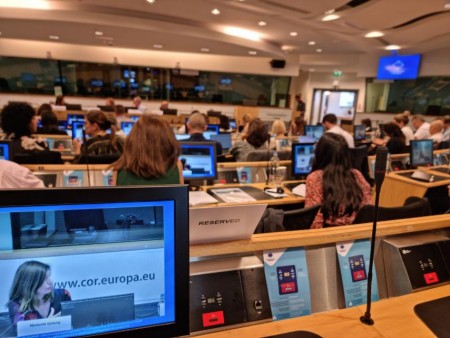Europe is suffering a second major economic shock in the brief span of only three years as a consequence of the ongoing war in Ukraine following on so soon after the depths of the Covid-19 pandemic.
Businesses are and will be further impacted by a major rise in the prices of gas and oil, by general inflation and by supply chain disruption, all of which has a knock-on effect on investor confidence. Perennial skills challenges are also continuing and undermining businesses’ efforts to revive their activities and contribute to the twin digital and green transition.
The chamber network’s close connection with the grass roots economy gains greater importance during such difficult times and the services and support that they provide to the business community are of even more value. Just as national chambers are in contact with the government institutions at member state level to discuss challenges and identify solutions, Eurochambres liaises with the EU institutions to mitigate the negative impact of the difficult economic conditions and to strive for a business-friendly Europe.
The event on 27 October at the European Committee of the Regions, exclusively to chambers of commerce, was revolved around the Eurochambres Competitiveness Compass, which defines four cardinal points for policymakers to address to foster Europe’s competitiveness: markets, skills, resources and compliance.
High-level institutional speakers and the European chamber leaders were invited to elaborate on this in order to identify key policy measures on each point of the compass to consider for the remainder of the 2019-2024 EU term and beyond.
To achieve the EU`s competitiveness we need: fighting high energy prices; deepening the single market; reducing skills gap; opening trade agreements said Luc Frieden, the President of Eurochambres.
The European Economic and Social Committee President Christa Schweng said that only competitive businesses can create prosperity in Europe: “We need to provide EU businesses with a favourable environment to innovate, invest and trade, including a level playing field with third country competitors.”
The Special Envoy for Czech Presidency from the Czech Ministry of Industry and Trade Tomas Prouza spoke in the resources session pointing out that “High energy prices impact our competitiveness. We need swift action to guarantee security of supply and limit price spikes, as well as easier access to finance to modernize the European economy and enable it to get going.”
MEP Anna Asimakopoulou highlighted the need to ratify FTAs. “It`s more important that we negotiate FTAs in the first place. It is time for a new generation of EU Trade deals.”
Deputy Director General of DG Growth Hubert Gambs noted the need to identify transition path and build industrial alliances to increase resilience, to accelerate twin transitions and to improve the EU single market.
